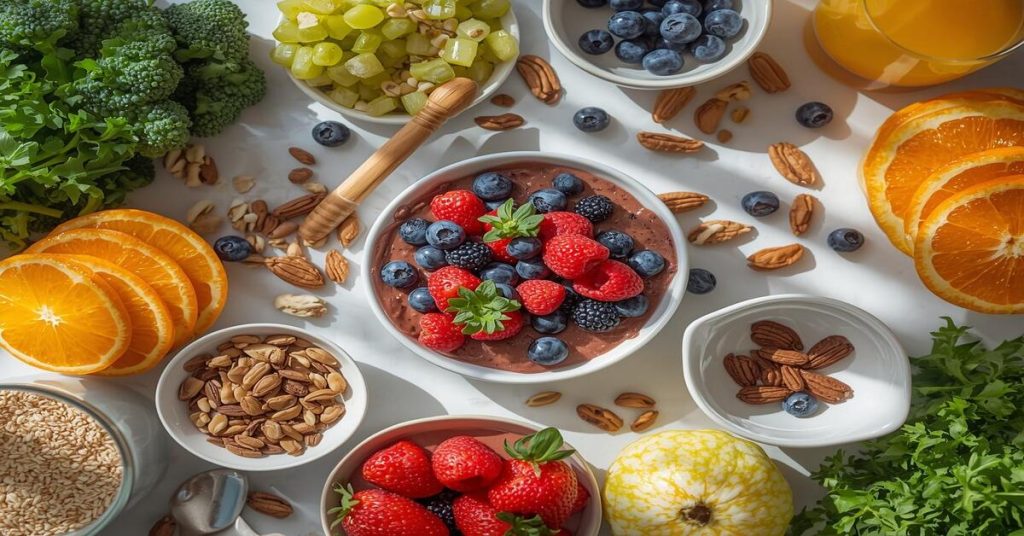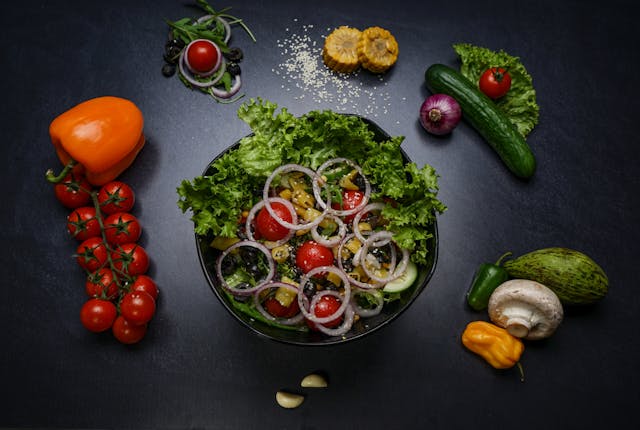8 Common Healthy Eating Mistakes (And How to Fix Them for Better Health!) 🥗

Maintaining nutritious eating habits is essential for energy, mental clarity, and overall wellness 🌱. However, even with the best intentions, many people unknowingly fall into common food traps that sabotage their health goals. In this guide, we’ll break down eight of the most frequent mistakes and how to fix them—backed by practical tips and real-life strategies.
Why Nutritious Eating Habits Matter in Everyday Life 🧠🍎
Eating isn’t just about filling your stomach—it’s about fueling your life. When you eat well, you feel better physically, think more clearly, and perform at your best in every aspect of life. But modern lifestyles often trick us into unhealthy patterns. Let’s explore how to reclaim your plate and power up your health through conscious choices.
Signs You’re Sabotaging Your Own Nutrition Without Knowing 😲
Are you feeling tired despite eating “healthy”? Experiencing cravings all the time? These could be signs that your healthy eating habits need some tweaking. Many people don’t realize they’re making basic mistakes—until the effects show up as fatigue, weight gain, or poor digestion.
Read more: Chrononutrition for Energy: 20 Proven Meal-Timing Strategies
Let’s Dive Into the Mistakes to Avoid 🚫🥄
Here are the top 8 common nutritious eating habits mistakes that most people make without realizing. Each one comes with a simple fix to put you back on track!
1. Skipping Meals to Cut Calories ⏰
Many people believe that skipping breakfast or lunch helps in reducing weight. In reality, it slows down your metabolism, increases hunger, and can lead to overeating later. Balanced, timely meals keep your blood sugar stable and support sustainable energy.
2. Relying Too Much on “Low-Fat” or “Diet” Foods 🧃
Just because something is labeled “low-fat” doesn’t mean it’s healthy. Often, these items are loaded with added sugars or artificial ingredients to make up for taste. Whole, natural foods without labels are your best friend for developing solid nutritious eating habits.
3. Not Eating Enough Fiber 🍞🍓
Fiber is key for digestion, blood sugar balance, and feeling full. If your meals lack vegetables, fruits, whole grains, or legumes, you’re probably falling short. Most people eat half the recommended amount of fiber daily—leading to constipation and cravings.
4. Drinking Calories Instead of Eating Them 🥤
Sugar-filled drinks like soda, flavored coffee, and energy drinks can skyrocket your daily calorie intake. Even smoothies and fruit juices can be tricky if they’re not made fresh. Opt for water, green tea, or infused water instead. Always read the labels!
5. Not Planning Your Meals in Advance 📅🍱
Without a meal plan, you’re more likely to grab unhealthy snacks or order takeout. Planning helps you stay on track, saves money, and ensures balanced nutrition throughout the day. Sunday meal prep can be a total game-changer in your nutritious eating habits.
6. Overeating Healthy Foods 🍚
Yes, even healthy foods can sabotage your goals if consumed in excess. Nuts, olive oil, and avocados are nutrient-rich but high in calories. Portion control is crucial. Don’t eat straight from the packet—always serve on a plate and be mindful while eating.
7. Ignoring Mindful Eating Practices 🧘♀️
Eating in a rush, in front of screens, or while distracted leads to overeating and poor digestion. Mindful eating—where you slow down and truly taste your food—boosts satisfaction and helps your brain register fullness properly. Make your meals a ritual, not a race.
8. Forgetting to Hydrate Properly 💧
Many people confuse thirst with hunger, leading to unnecessary snacking. Staying hydrated supports digestion, detoxification, and mental focus. Aim for at least 8 glasses of water per day, more if you’re active or live in a hot climate.
Read more: Transform Your Life with Balanced Eating Habits
Bonus Tips to Build Long-Term Nutritious Eating Habits 🏆
- 📝 Keep a food journal to track eating patterns and triggers.
- 🥗 Fill half your plate with vegetables at every meal.
- 📚 Educate yourself on nutrition labels and ingredients.
- 🤝 Involve your family or friends for accountability and fun.
- 🛒 Shop with a list to avoid impulse buying.
How to Turn Awareness into Action 🚀
Knowing the mistakes is half the battle; the real change happens when you adjust your daily habits. Start small—choose one area to work on each week. Gradually, these tiny improvements will lead to lasting transformation in your health and energy levels.
Creating a Balanced Relationship with Food 🥦💛
For many people, eating becomes a battlefield—filled with guilt, confusion, or extreme rules. But nutritious eating habits aren’t about perfection. It’s about building a peaceful, consistent, and nourishing relationship with your food. When you enjoy what you eat and fuel your body with real nutrients, the journey becomes joyful instead of stressful.
The Power of Nutrient-Dense Foods 🥗🔋
Nutrient-dense foods offer the most vitamins, minerals, and antioxidants with the fewest calories. Think leafy greens, berries, eggs, sweet potatoes, legumes, and fatty fish like salmon. These foods not only support your energy and immunity but also make you feel satisfied and full longer. When you make them the base of your meals, cravings and fatigue become a thing of the past.
Breaking the Sugar Cycle 🍬🚫
One major disruptor of nutritious eating habits is refined sugar. While it’s fine to enjoy sweets occasionally, frequent sugar consumption leads to mood swings, blood sugar crashes, and long-term health issues. Focus on natural sweeteners like fruit, honey, or dates when possible. And always check food labels—sugar hides under names like corn syrup, maltose, and dextrose!
Understanding Emotional Eating 😔🍫
It’s common to eat out of boredom, stress, or even happiness. Emotional eating disconnects you from your body’s true hunger signals. Instead of turning to food for comfort, explore healthier coping mechanisms like journaling, walking, deep breathing, or talking to a friend. Cultivating emotional awareness around food helps reinforce your nutritious eating habits.
Reframing the “Cheat Meal” Mindset 🧠🍕
The idea of “cheat meals” creates unnecessary guilt and a black-and-white view of food. Instead, adopt an “all foods fit” approach. You can enjoy a burger or ice cream without sabotaging your health—as long as your overall routine stays balanced. Remember, food is not a punishment or a reward. It’s nourishment and joy.
The Importance of Cooking at Home 👩🍳🏠
Preparing meals at home helps you take charge of ingredients, portions, and cooking methods—key steps toward building nutritious eating habits. It also deepens your connection with food and promotes mindfulness. Try cooking at least 4–5 meals a week. Begin with simple dishes like soups, stir-fries, or roasted vegetables—they’re easy, delicious, and supportive of your health goals!
Read more: Health Benefits of Apples – Complete Guide
Boosting Your Plate with Color 🌈🍽️
Eating the rainbow is a simple trick to enhance your nutrition. Each color in fruits and veggies offers unique health benefits: red (heart health), orange (vision), green (detox), purple (brain function), and yellow (immunity). Aim to include at least three colors in every meal—it makes your plate more exciting and nutritious.
Protein: The Secret to Lasting Fullness 🍗💪
Many people don’t consume enough protein, which can lead to constant hunger and muscle loss. Including good-quality protein in every meal—like tofu, chicken, lentils, eggs, or yogurt—stabilizes your appetite and supports metabolism. For plant-based eaters, combining legumes with whole grains offers complete amino acids.
How Sleep Affects Your Eating Choices 😴🍩
Sleep and nutrition are closely linked. Poor sleep increases cravings for sugary or high-fat foods and reduces willpower. Aim for 7–9 hours of restful sleep each night to support hormone balance and better food decisions the next day. Want better nutritious eating habits? Start with your sleep routine first!
Smart Grocery Shopping Habits 🛒📋
- ✅ Don’t shop when hungry—it leads to impulse buying
- 🧾 Stick to a grocery list to avoid unhealthy choices
- 🥫 Shop mostly from the store perimeter—where fresh foods live
- 🍎 Choose whole ingredients over processed snacks
- 📦 Always read labels—watch for added sugars, sodium, and trans fats
Building Sustainable Habits: It’s a Lifestyle, Not a Diet 🛤️❤️
The best nutritious eating habits are the ones that fit your life—not control it. Don’t chase quick-fix diets. Instead, focus on gradual, doable shifts: swapping white rice for brown, drinking water instead of soda, or adding an extra vegetable to dinner. Over time, these tiny choices compound into powerful health improvements.
Empowering Your Family Through Nutritious Eating Habits👨👩👧👦🍽️
Kids and adults alike benefit from better nutrition. Teach children how to cook simple meals, explain where food comes from, and lead by example. When families eat together, they build stronger bonds and better habits. Healthy eating becomes a shared journey, not a lonely struggle.
Social Eating Without Stress 🍕🎉
Parties, weddings, and dinners out don’t have to ruin your goals. Just plan ahead: eat a healthy snack beforehand, stay hydrated, and focus on the company, not just the food. Pick one indulgence and enjoy it guilt-free. You can be social and still protect your nutritious eating habits.
Nutrition is Personal: Listen to Your Body 👂🍽️
There’s no one-size-fits-all approach to food. What works for your friend may not suit your body. Some thrive on three large meals, others prefer five small ones. Some love meat, others are plant-based. Pay attention to your energy, digestion, and mood after meals—and adjust accordingly.
How Your Environment Shapes Your Eating Habits 🏡🥕
One of the most overlooked factors in developing nutritious eating habits is your environment. If your kitchen is stocked with chips and soda, that’s what you’ll reach for. If fruits, nuts, and whole grains are visible and ready to eat, healthy choices become effortless. Try organizing your pantry, fridge, and workspace in a way that nudges you toward better options. It’s a simple change that creates lasting impact.
Mindful Snacking: Fuel, Not Filler 🍎🕰️
Snacking isn’t the enemy—mindless snacking is. Most people snack out of habit, not hunger. Choose snacks with a balance of protein and fiber, like hummus and carrots, Greek yogurt with berries, or a handful of almonds. Eat slowly and without distractions to really enjoy the food and recognize when you’re full. Quality snacking supports your energy, metabolism, and nutritious eating habits.
The Weekend Trap: Stay Consistent, Not Perfect 📅🍟
Many people stick to their health goals during the week but lose track over the weekend. While it’s okay to relax, swinging too far off track can make Mondays harder. A better approach? Allow yourself flexibility while still following core nutritious eating habits—like drinking water, eating breakfast, and prioritizing real food over fast food. Think “consistency over perfection.”
Hydration and Hunger: Know the Difference 💧🍽️
Dehydration often masquerades as hunger, leading to unnecessary snacking. A good rule? If you’re feeling snacky, drink a glass of water first and wait 10 minutes. Most times, the craving passes. Carrying a reusable water bottle and setting hydration reminders on your phone can help you stay on track. Proper hydration supports digestion, skin health, energy, and clearer food choices.
Read more: 7-Day Clean Eating Meal Plan for Beginners to Boost Energy Naturally
Eating with the Seasons: Nature Knows Best 🌾🍓
Seasonal eating is a beautiful way to reconnect with nature and diversify your nutrient intake. Summer brings hydrating fruits like watermelon and cucumber, while winter provides grounding root vegetables like sweet potatoes and carrots. Seasonal produce is often fresher, tastier, and more affordable. It also supports local farmers and aligns naturally with what your body needs during each season—a bonus for your nutritious eating habits.
Overcoming the “All or Nothing” Mentality 🧠🔄
One missed workout or one unhealthy meal doesn’t erase your progress. But the all-or-nothing mindset convinces you to give up entirely. Real change happens with persistence, not perfection. Skip the guilt and get back on track with your next bite or meal. Every positive choice counts. Remember, you’re building a lifestyle, not following a short-term diet.
Eating Out the Healthy Way 🍽️🌿
Dining out doesn’t have to derail your nutritious eating habits. Look for grilled options, extra vegetables, and request sauces on the side. Don’t hesitate to customize your order—most restaurants are happy to accommodate. Eat slowly, stop when you’re 80% full, and skip sugary drinks. With a few mindful tweaks, eating out can be enjoyable and balanced.
The Role of Culture and Emotion in Food Choices 🌍❤️
Food is deeply cultural and emotional. It connects us to our family, heritage, and comfort. Instead of rejecting traditional dishes, look for ways to make them healthier—baking instead of frying, using less oil, or adding more vegetables. Your cultural meals can fit perfectly into your nutritious eating habits when prepared mindfully.
Understanding Portion Distortion 🍛📏
Over the past few decades, portion sizes have grown drastically, leading many people to eat more than they need. Use smaller plates, serve reasonable portions, and avoid eating directly from packages. Learning to recognize hunger and fullness cues will help you stop when satisfied—not stuffed. It’s a small but powerful tool for long-term wellness.
Read more: 15 Healthy Eating Habits for Better Energy and Wellness
Frequently Asked Questions (FAQs) 🤔📚
Q1: What are the most important nutritious eating habits to follow daily?
A: Focus on balanced meals with protein, fiber, and healthy fats. Drink plenty of water, eat whole foods, and avoid skipping meals. Practice mindful eating and avoid processed snacks as much as possible.
Q2: Can I still enjoy my favorite foods while eating healthy?
A: Absolutely! Healthy eating isn’t about restriction. It’s about balance. Enjoy your favorite treats in moderation while making nutritious choices most of the time.
Q3: How do I stay consistent with nutritious eating habits when I’m busy?
A: Meal prep is key. Spend one day a week planning and preparing meals. Keep healthy snacks on hand and create a simple weekly menu to avoid last-minute junk food decisions.
Q4: Is it necessary to count calories for nutritious eating habits?
A: Not necessarily. Instead of obsessing over numbers, focus on the quality of your food. Eat mindfully, stop when full, and ensure a variety of nutrients on your plate.
Q5: How can I get my kids to eat healthier?
A: Involve them in grocery shopping and meal preparation. Make food fun with colorful veggies and creative presentation. Avoid forcing or bribing; instead, model healthy behavior yourself.
Final Thoughts 🌟

Achieving a truly healthy lifestyle doesn’t mean being perfect—it means being informed, intentional, and consistent. Avoiding these eight common mistakes will not only improve your nutrition but also boost your overall sense of well-being. Always remember: food is fuel, and your body deserves the best.
Want more actionable tips on nutritious eating habits? Stay tuned with our blog and explore more guides under our “Healthy Eating & Nutrition” section.
To explore more about nutritious eating habits and evidence-based nutrition, you can visit this helpful guide from Healthline.
And here’s a lighter lifestyle blog discussing real-life struggles with nutritious eating habits, which might inspire you on your journey: Example Lifestyle Blog.



Pingback: Top 10 Powerful Health Benefits of Mango 🥭 You Must Know